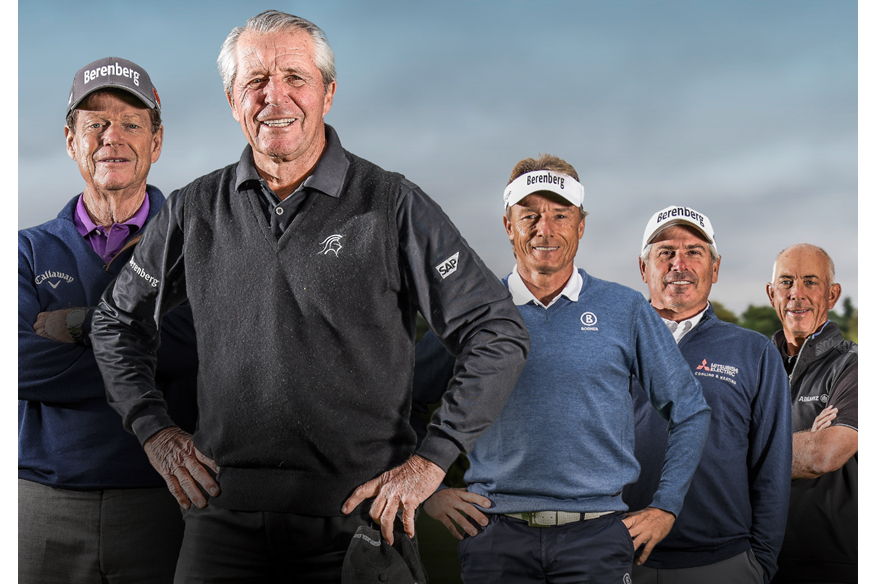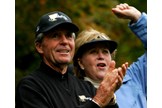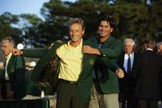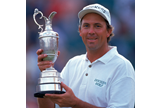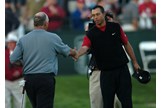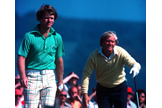Lessons of a lifetime: 5 legends talk about their careers
Last updated:
Between them, these five men have won 48 major titles… But how could their experience help you?
We recently sat down with Tom Watson, Gary Player, Bernhard Langer, Fred Couples and Tom Lehman to find out what you could learn from their experiences.
Sitting in the plush restaurant at Wentworth Golf Club, the five golfers around me really know what they’re talking about. On my right is Tom Watson and Gary Player. On my left is Bernhard Langer. Next to him is Fred Couples and Tom Lehman.
Between them they’ve won practically everything in the game – PGA Tour events, Ryder Cups, Presidents Cups… and the small matter of 48 Major titles on both the regular and the senior circuits. What they don’t know about golf – competing at the highest level, improving, grinding out a good score – isn’t worth knowing.
We were invited to sit down with all five for an exclusive chat before they starred in the latest Berenberg-backed Gary Player Invitational, an annual tournament, staged on the Player-designed Edinburgh Course at Wentworth Club. The event is part of the Gary Player Invitational series, which has helped The Player Foundation raise more than $63million for charitable causes around the world.
This year it was won by the team led by Padraig Harrington and Ladies European Tour star Alex Peters. It took place on the Monday of Senior Open week, just days before Langer went on to claim his 10th Senior Major at Royal Porthcawl. Even the players present were in awe of Langer’s success, with Watson saying: “Bernhard is the Tiger Woods of the Senior Tour, he really is. He’s absolutely killing it.”
Ever humble, Langer chipped in: “All the guys here are true champions, and to be in the presence of all these greats is a great honour… they’ve achieved amazing things. It’s always fun for me to hang around with these guys. I learn from all of them.” With so much experience on tap, we asked them to pass on their best advice from a lifetime in the game…
What’s the key to your longevity?
TW: I say this tongue in cheek, but mainly I have good genes. I have the right body for it. I have very strong legs and I think a lot of it has got to do with the physical part of it. Plus I found the secret to my golf swing in 1994 when I made a change that allowed me to hit the ball better than I ever had before. I found the key at 3.15pm during practice on a Tuesday afternoon at the Heritage Classic, 1994, Hilton Head, South Carolina. I was tired of hitting the ball with toe-deep divots out to the right. I decided to swing like Corey Pavin’s practice swing. Swing to the left through impact. As soon as I did that, I hit the ball perfect. Divots were square, and I had a different feeling with my right shoulder. It wasn’t as low coming into the ball. It all had to do with shoulder plane, keeping it the same on the downswing as it was on the backswing.
FC: I think the big secret is talent, whether you’re an athlete, actor or singer, and then you need a lot of luck. Everyone gets injured and for me it’s always been my back, though I’ve been able to play around it. Many people – Tom is among them – are very loose, which allows them to carry on playing.
GP: Firstly, you have to look after your body and to be fortunate to have the right genes enabling you to have that body. You can’t do anything without health so it’s about eating properly, exercising and sleeping well. Then it’s being happy and finally a good marriage helps. Also, I think it’s important to have a knowledge of the golf swing – in my 64 years as a pro, I only met one person who knew the swing from A to Z. That was Ben Hogan.
BL: I’ve been blessed with fairly good health. I haven’t had any Major injuries except with my lower back and that was a long time ago. I love the game, and that drives me to still work at it. I enjoy competing owing to the competitive instinct I have. Those are the main things which keep me going, though I also have a great support system, a great family, a good coach and caddie and have had some great sponsors over the years.
TL: Two things. The most important is staying excited about playing golf. It starts with your mind – you have to love the game and want to work at the game. If you don’t have any of that, you’re not willing to do all the other stuff it takes to maintain it. The next thing is that your body has to hold up for you.
Was there a single turning point in your career and, if so, what?
TW: The mid-1990s when I changed my swing. It wasn’t a big move, it was something different. I had struggled for 10 years with my swing – I was doing the same thing that Jordan Spieth does, hitting the ball right… right, right, right. And the reason was my right shoulder was too low at impact. Once I kept that a bit higher at impact, that allowed me to hit the ball straight, not push it out to the left. That was it in a nutshell.
FC: I made the Ryder Cup team at The Belfry in 1989 and I lost a critical match against Christy O’Connor. Tom was on the team along with Curtis Strange and a bunch of top players with Ray Floyd the captain, and at 28 years old I was a young-ish upstart. I saw how big a deal it was to them, and I wanted to be on that team more and more and I wanted to play even harder. That inspired me.
BL: I got on Tour aged 18 and will be 60 in August (*this interview was conducted before his 60th birthday) so I’ve been very lucky to have over 40 years of golf at the highest level.
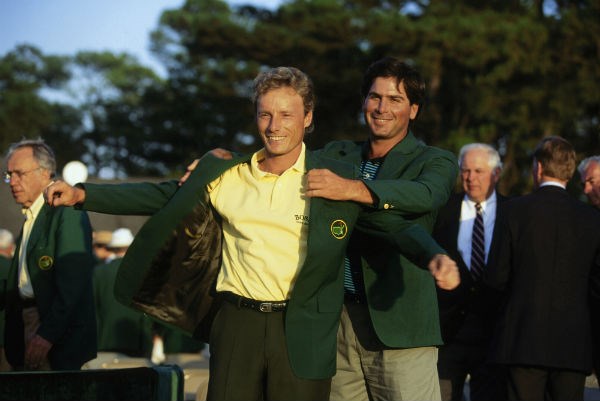
Bernard Langer is handed the Masters green-jacket by Couples at Augusta National in 1993
GP: Winning my first Open at Muirfield in 1959. I’m a poor boy, I haven’t got any money and The Open is the most important tournament in my life – nothing else compares. And I become the youngest man ever, at 23, to win it… and I’ve got no money. And I came from eight shots behind to win it using that old crazy equipment and lousy course conditions – I shot 284 in rain and wind. I was a fighter.
TL: Most players are naturally confident and believe they are the best. Others have to earn that and prove it to themselves. Many go through peaks and troughs and at some point you say to yourself either ‘I can’t do this’ or ‘yes I can’. For me, it took a series of failures before I eventually got over the hump trying to get my card at the Tour school. That was when I knew I could compete.
Have you had to overcome many hurdles? And if so, how?
TW: Frankly, for a while, I hated the game because I couldn’t produce. The harder I practised, it just didn’t work, so I took time off, six weeks at a time, a couple of times and never touched a club. But that didn’t work. It was down to the fact that my swing was awed and until I found that ‘secret’ it became easy again. We’re all looking for that and it could be just one shot that brings it about.
FC: My parents both died when I was fairly young on Tour, so they didn’t get to see me play much. Then I got married and my wife got cancer and passed away. So playing poorly wasn’t the end of the world. I was just talking to a friend yesterday who was playing in a tournament with his dad and he was telling me how badly he was playing. I said I’d give anything to have one more round with my dad. You need perspective. You lose a tournament here, you lose a tournament here, but that’s OK. Golf isn’t everything.
BL: I’ve had plenty of adversity. I’ve had the putting yips four times in my career. I’ve had personal grief – I lost my sister, I lost my dad – there’s always some heartache going on sooner or later. None of us are immune.
TL: Just not quitting. With my history, I spent a lot of time playing overseas, playing mini- Tours and would be among the top players there, but I would go to PGA Tour qualifying and miss out. It was a case of hanging in there and persevering and not saying ‘to heck with this, I’m done’.
How has your fitness regime changed since early in your career?
TW: You know what, I never worked out. My fitness was hitting three or four hundred golf balls every day, so why did I have to work out? That’s more than a workout! These kids today, they work out with weights and things like that… they should be out there hitting three or four hundred balls a day. I’m not discounting the fact that they can get stronger their way. I just know how I did it and what my work-out resume was. Obviously I know Gary has been a fitness buff throughout his career. Would I do it differently? Probably, if everybody else was working out like that. The problem I have right now is I don’t hit 300- 400 balls a day and I don’t work out a lot – maybe with a trainer three times a week, but not every day. So in reality, I’m losing my strength.
FC: Well, the last year I’ve actually had one! I’ve played golf with baseball players, I’ve played with tennis players and they’ll say how sore they are and they are so fit. The more you do it, the better you’re going to get, but you’ve got to watch your body and Tom’s body is perfect for golf. He’s one of the hardest practisers that’s ever played along with Vijay Singh and Tom Kite. I’m not. I’d rather go out and play.
BL: I’ve always enjoyed fitness though, I had a back injury when I was 18 or 19 and at that point I realised I might not be jogging and running all my life because it’s not good for me. I have to stretch more and just take care of my body in a different way. As I got older I couldn’t do what I did in my 20s and 30s, so I focused more on flexibility so my workouts changed a bit in that regard.
How has technology changed the game for you, and average golfers?
FC: I think it’s made the game easier for us pros, but I don’t think any club has made the 15 handicapper’s game easier – and that’s why I feel like the ball they use should have a little more oomph to it, so they can hit it a bit further. I mean, our balls certainly are – I hit the ball now a lot further than I did when I was 25, and that’s all down to the equipment. I’ve kept two or three of my old clubs and you put them down and they look like pieces of junk! Also, the condition of the courses is unreal – there’s not a bad patch of grass today.
BL: You always need skill to be at the very top, but the ball goes so much further and the driver is so much more forgiving nowadays. It’s become a power game there’s no doubt about it.
TL: It’s simply changed the way people approach the game. It’s a whole new style of play and the teaching that goes with it is taking advantage of that technology, so players are becoming more or less the same. There are many ways you can hit a golf ball solidly, but only one way to generate speed. It’s a pretty simple dynamic, so as a result everybody’s swing is looking more and more similar. Today, the guys are magicians with their wedges – there’s no change in skill level. It’s a case of hitting it 340 and taking what you get and there’s a skill in that and that’s why it’s so hard to win today. Take Rory – when he’s on, he’s virtually untouchable, but when he’s off you can beat him. Tiger was different. He could play poorly and still win.
How have your ambitions changed?
TW: They haven’t changed. I’m still trying to hit the best possible shot, every time I hit it. It all boils down to that. Dull, I know, but it’s true. BL: They’re still very similar really. The main thing is to improve, and if I can improve I know I can compete at the very highest level. If I can improve a little bit here and there, victories will happen. Those are the goals. The end result now would be to win the Champions Tour’s Player of the Year and head the money list and top certain categories such as the greens in regulation or putting stats.
TL: I know one thing for certain that hasn’t changed – I don’t like getting beat regularly by anybody. So I’m playing on the Champions Tour with Bernhard, who is so dominant. As much as I love Bernhard, I don’t like getting beat by him! But that’s what makes you work and prolongs your career, because you want to prove to yourself that you’re capable of beating somebody that good.
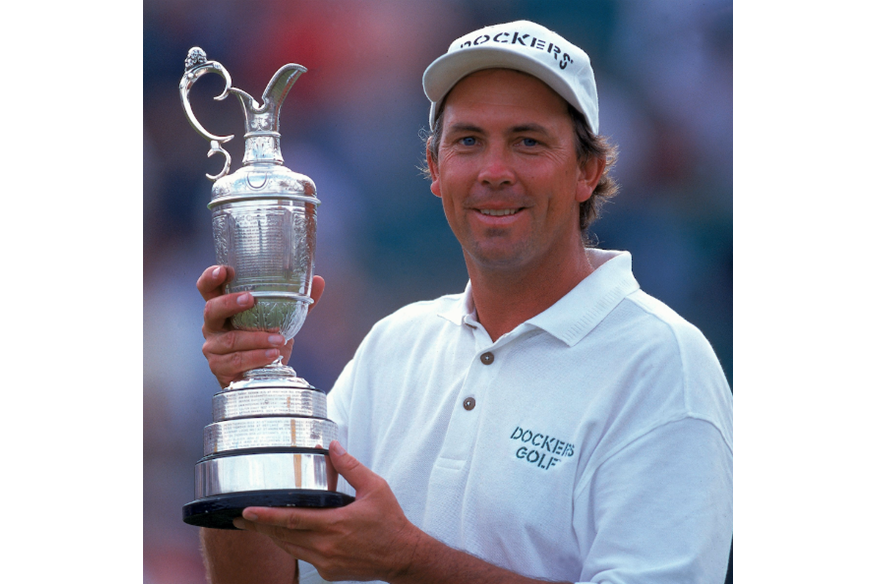
Tom Lehman lifted the Claret Jug at Royal Lytham in 1996.
What does the future hold for you, and the game in general?
TW: Right now I’m playing seven or eight tournaments a year, having reduced it from a dozen, and will probably to reduce it until I feel I can no longer compete at senior level. I haven’t reached that time yet. As for the game itself, I see in America especially that a decline in junior players has turned around, it’s started to increase in fact and that’s the future of our game. And that’s what I’m committed to, particularly in my local area (Kansas), to create programmes for kids to learn the game right from the beginning. What I love about Scotland is that they give free lessons to the juniors up there. How about that?
GP: Hopefully to live until I’m 100! I will do anything within my powers to help make the game grow and it was fantastic to see golf back on the Olympics stage in Rio last year.
BL: For me it’s all about one thing – winning.
You’ve all had a hugely successful career but what would be the highest of the highs?
TW: My little duel with Jack Nicklaus at Turnberry in 1977 would be right up there. That was the beginning of my run: I’d won the Masters earlier in the year and a couple of other tournaments. But playing with Jack over the last two rounds, and winning by a shot, confirmed to me that I could not only play with the big boys, I could beat them! That was a watershed moment for me.
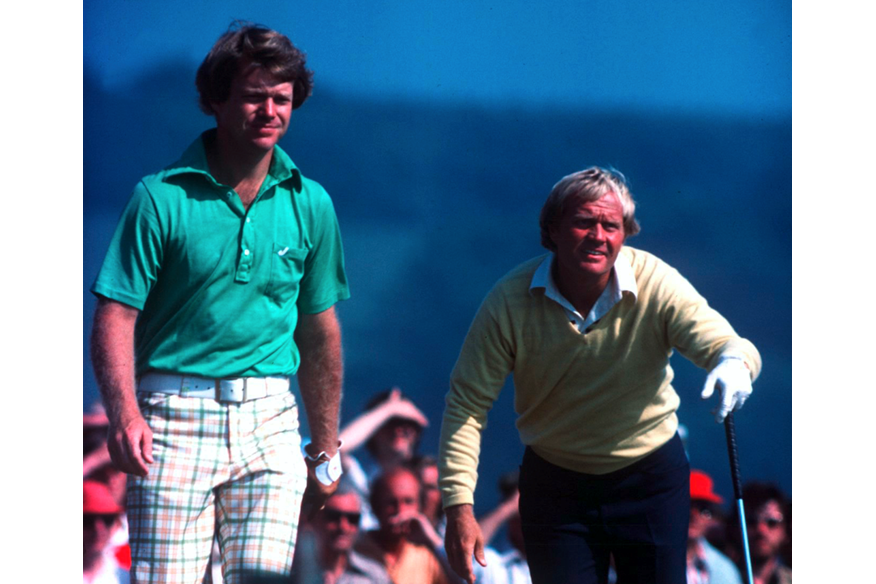
Watson’s best career moment? His 1977 ‘Duel in the Sun’ with Jack Nicklaus at Turnberry
FC: The Players Championship in 1984 when I beat Seve and Lee Trevino. I thought wow! I could play, but going head-to-head with those guys and then obviously winning the Masters at Augusta in 1992. Plus playing in the Ryder Cup; even though we lost more than we won, it was still fun.
TL: Winning the Open at Lytham in 1996 was one of them alongside being part of the winning 1999 Ryder Cup team and the captain of the 2006 team at the K Club, though losing was no fun. Winning the Phoenix Open in my hometown was pretty special, too.
Who is the greatest you’ve played against?
TW: Jack Nicklaus. He’s probably the best thinker on a golf course. I guess even he got nervous, but he always thought better than anybody else.
FC: I played with Jack Nicklaus and Tiger about the same amount of tournament rounds, but I played more practice rounds with Tiger. And I’ve never seen anyone hit a ball like Tiger. He is the best player I’ve ever seen play – but Jack is the greatest ever to have played. No doubt.
BL: It’s such a fine line. Tiger may have been the best when he was at his best because he had it all – length, touch and mind. He could perform under pressure… he was complete. Nicklaus was very similar. He may not have been as good a bunker player or chipper and pitcher as Tiger, but he had everything else.
GP: Nicklaus is the greatest golfer period scoring-wise, but the greatest golfer from tee- to-green is Ben Hogan. Why? He won nine Majors, but went to war for ve years and then came back but couldn’t play because of a serious accident. In his prime, he couldn’t play in 13 Majors. How about that?
TL: Tiger. I was caught right in the middle of the best of his best. I still can’t remember him missing a putt he had to make.
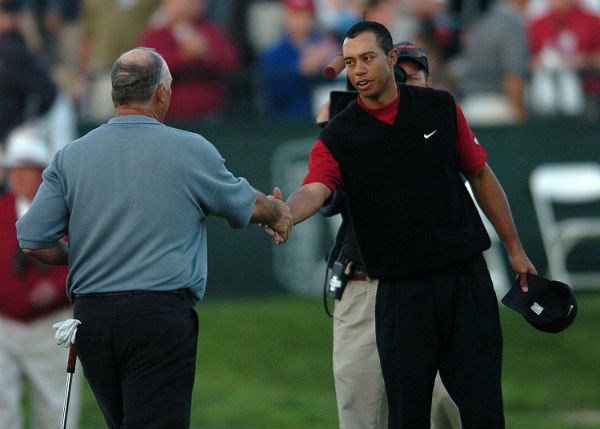 Tom Lehman is bested by Tiger Woods at the 2005 Buick Open at Torrey Pines
Tom Lehman is bested by Tiger Woods at the 2005 Buick Open at Torrey Pines
What advice would you give to promising players and amateurs generally?
TW: Look at the best players and copy them by discovering what makes them special.
FC: Number one is you’ve got to have patience for the game of golf. It would have been weird if some guy had told me when I was 22 what I’m about to tell you… hey, it’s not a sprint, it’s a marathon. At 22, I’d have said ‘get away from me’, but Tom has been playing forever and you can’t worry about two months when you’ve played poorly, you’ve just got to hang in there, you’ve got to practice and keep doing it. I’m more about getting people pumped up to play well.
BL: I always say stick with the fundamentals, don’t get lost in the technique of the swing. Focus on the fundamentals – the grip, the stance, aim, ball position, that kind of thing. Keep it simple and then surround yourself with good people, especially if you want to be a pro, including a coach you trust and a caddie who knows what he’s doing and a manager that is reliable and trustworthy.
GP: Make sure you get a good wife! In my life I’ve travelled more miles than any human being, sometimes for up to two months at a time and not in jets either, 40 hours to America, 40 hours to Australia, stopping four times, and sometimes with six kids! 99 out of 100 women would have divorced me! But Vivienne has been a power of strength. Another thing is hard work; there should be no sense of entitlement – and, as Churchill said, ‘manners maketh the man’.
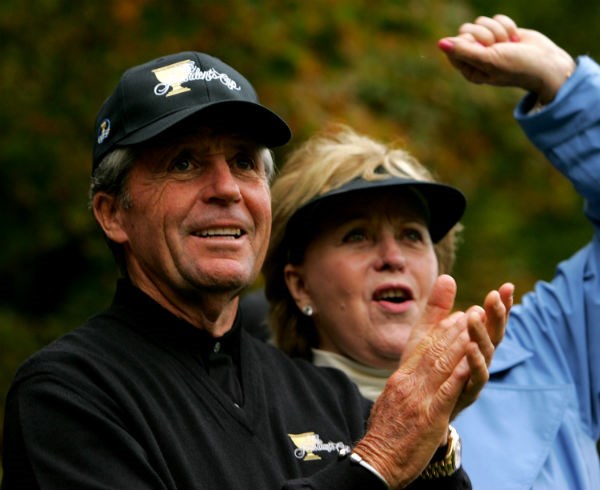
TL: It’s really important that every player has a honest assessment and belief in how far they can go. How good can you be? If you have this reality check then it’s simply a battle of you against you. I always believed if I played to my potential I was going to win and if I didn’t win it was usually because I made a mistake or two, but almost never because somebody else was better. The only time I got to that point was when Tiger came along…
